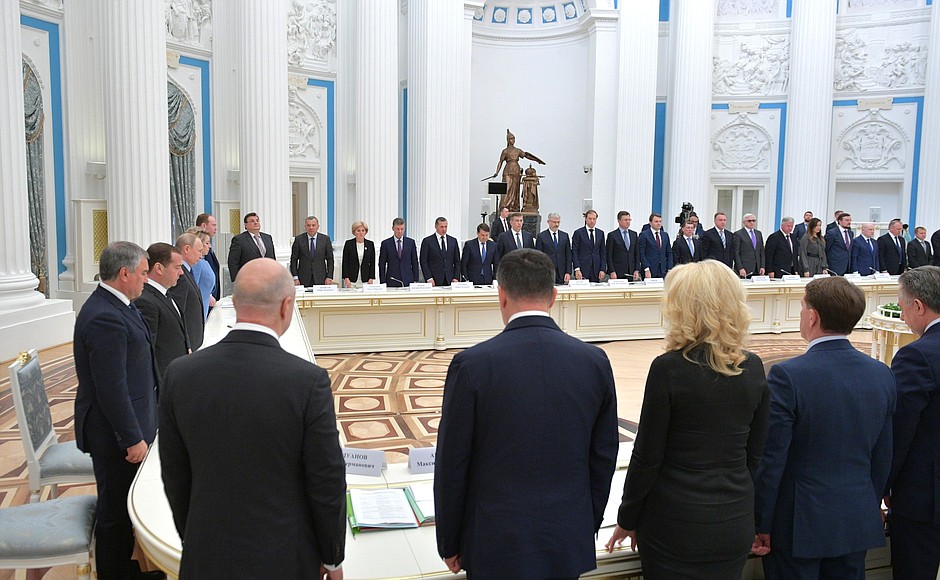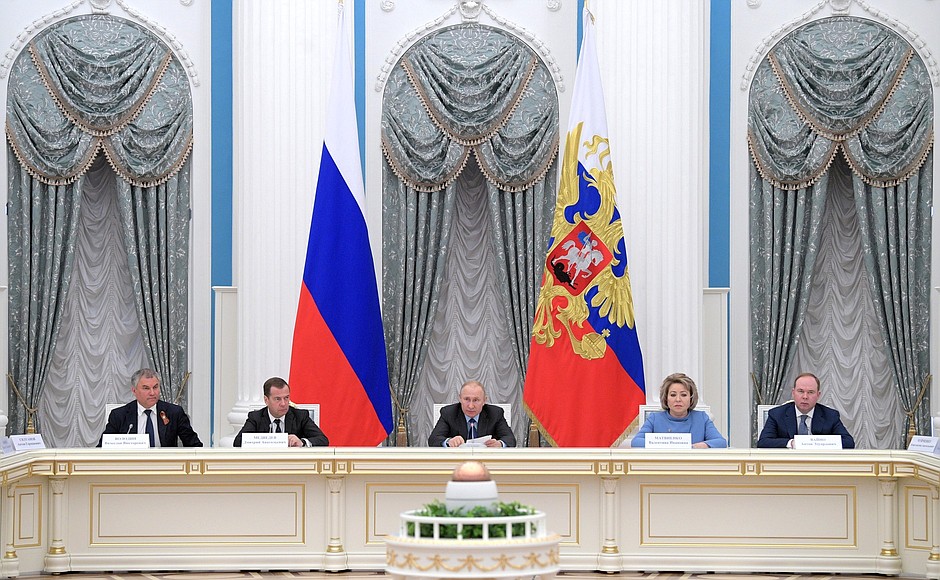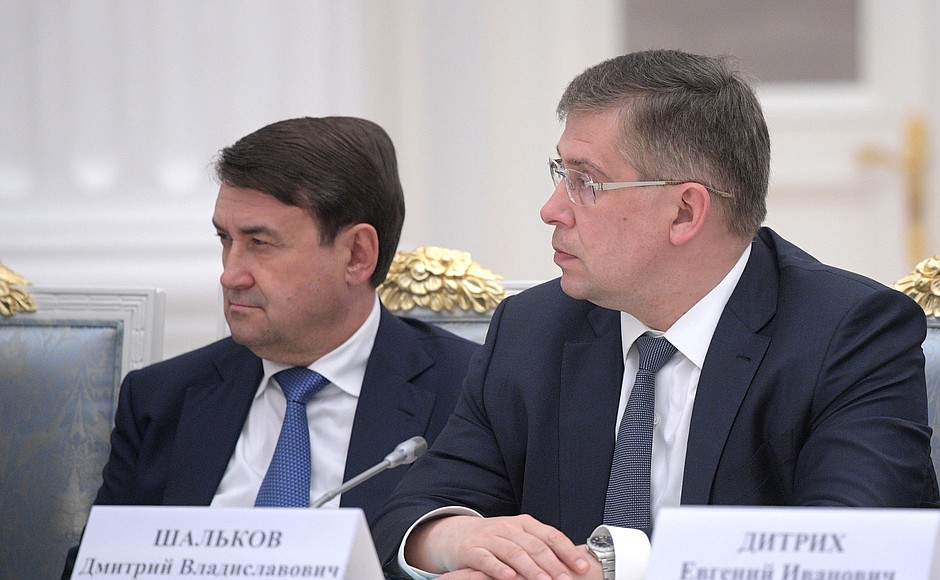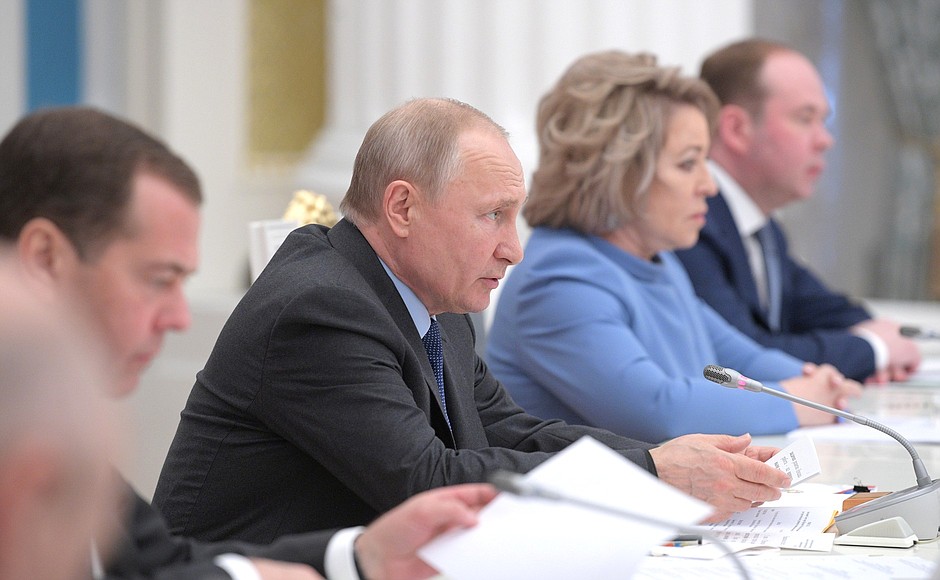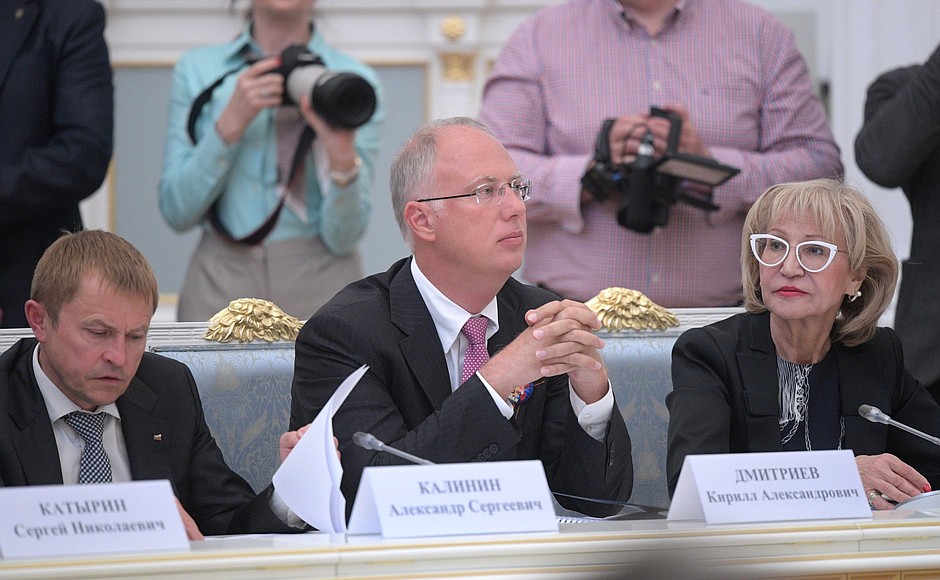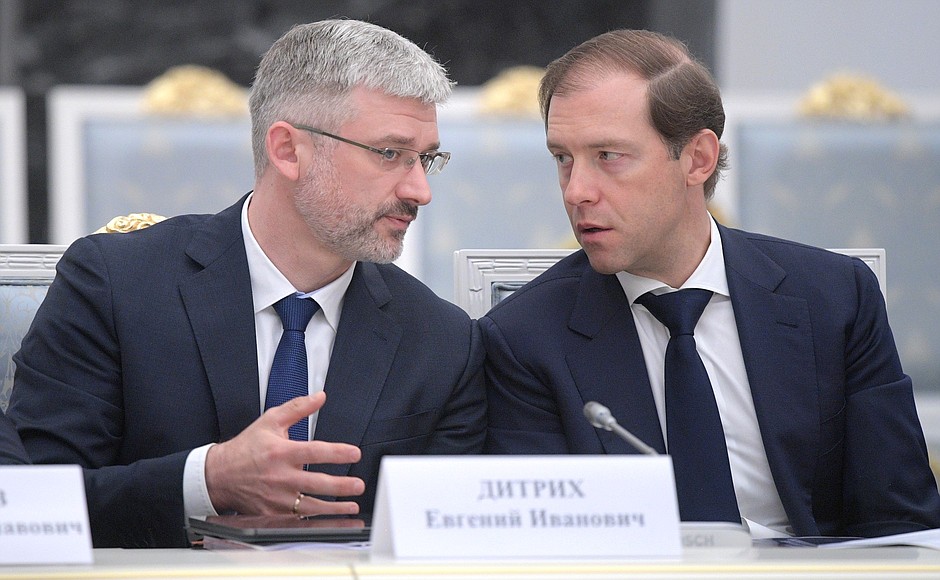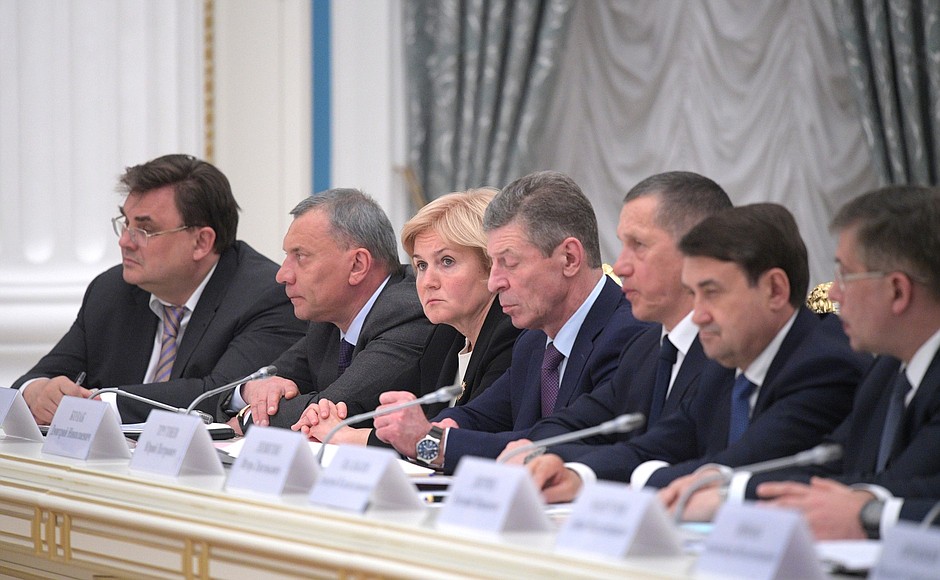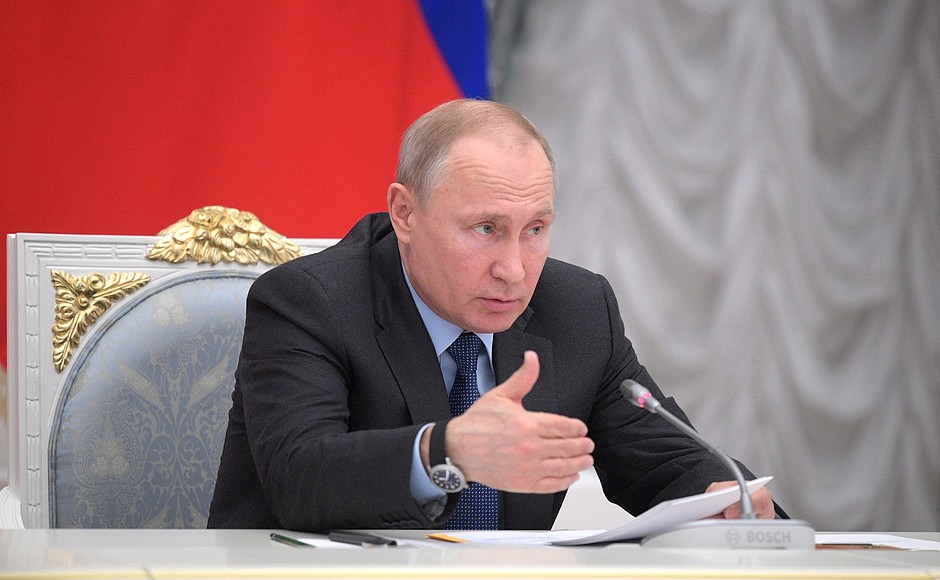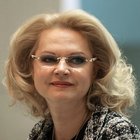President of Russia Vladimir Putin: Good afternoon, colleagues,
Before we start our work, you know that a tragedy, an aviation accident that claimed many lives, happened at Sheremetyevo airport on May 5. I kindly ask you to honour the memory of the victims with a minute of silence.
(Minute of silence.)
Thank you.
Now about the gist and theme of our meeting. The Executive Order on national goals and strategic objectives was signed a year ago. We started working on national projects that are crucial for the country’s socioeconomic sphere, for all regions of Russia, and for improving living standards. In effect, all these measures are aimed at this goal.
We regularly discuss key issues and the situation in the priority sectors during working meetings and State Council meetings together with the regional leaders and members of the public. This is important for systematic and coordinated work at all levels of government, business and professional communities in the areas that are important for the country's development.
Today, at this meeting of the Council for Strategic Development, I propose that we conduct a kind of “inventory taking” and do so substantively, I would even say, critically, without avoiding the so-called sensitive issues and see what has already been accomplished within the framework of national projects, where there is progress and where, on the contrary, there are obvious failures.
Let me remind you of what I have often mentioned. As a matter of fact, colleagues, you also mention this in different situations and at different venues. People are not interested in abstract promises, departmental plans or schedules, or a lot of technicalities. These issues must be dealt with by us, not the citizens who just want concrete results. They do not care how things were agreed upon, or when the funds were transferred to certain projects.
The result is what matters for people, here and now, not in some distant future. In any case, people should see that the process is underway, that it is positive and leads to these results. I call upon all the officials who are responsible for implementing national projects – you need to show people the results of your work, those clear and tangible changes that improve the lives of Russian families and each and every person.
However, unfortunately, and I have to say this openly today, we often, not always, but often, see an inert and bureaucratic approach, a desire to shift responsibility to someone else and to postpone meaningful work ”for later.“
Deadlines for drafting regulations and national project goals are being put off for no reason, literally “at one’s own discretion.” One delay triggers a series of others and the work stalls. Please stick to the established deadlines. Changing deadlines should be a rarely used and properly substantiated exception to the rule. Better yet, get rid of this habit altogether.
When I emphasised in the Address that “there is simply no time to lose,” this was not a figure of speech but a clear-cut, strict and individual requirement – to the Government, federal agencies, and to regional and municipal teams. I would like to ask you to be guided by this at all times, not just by some reporting dates or deadlines for fulfilling instructions.
Let me add that each regional leader should be personally and practically involved in the implementation of national projects in his region, and conduct this work in contact with the people, informing them in detail about decisions and explaining the logic and goals of all our actions. The success of the entire national development strategy is largely determined at the local level.
However, this does not mean that all issues can be shifted to the regions that will merely have to report on their performance. The work on national projects should be carried out through a concerted effort, and the federal agencies and departments should act as the interested partners of the regions. They should effectively, in permanent ad hoc groups, monitor and coordinate the general course of the work, help their colleagues, remove any difficulties, obstacles or inconsistencies in a timely manner. It is only natural that they do occur, on their own, but we need to work on them.
Systematic, smooth work of the executive and legislative authorities is required everywhere, on all national projects, primarily in the social sphere. I am referring to achieving specific objectives like creating capacity in nurseries, opening new paramedic centres and houses of culture in rural areas, renovating school buildings, upgrading vocational schools and colleges, launching programmes for retraining and upgrading skills, especially for pre-pensioners and young mothers, and introducing convenient and accessible government services in a modern digital format. I expect the Government’s social block to deliver a detailed report on these topics.
I repeat: we will hold a detailed discussion on various problem spots that have to be eliminated quickly, matters in need of pinpoint and effective adjustment, areas where we are lagging behind.
Substantial organisational preparations for practical implementation were conducted before these national projects began. Despite this, it turned out that the regulatory framework and bylaws were not issued for all projects. Methodological support is also behind schedule, and all this makes work more difficult in the regions.
In addition, we have noted setbacks during the financing of certain parts of national projects. We have discussed this, and the Prime Minister has noted it. I know that he has conferred with his colleagues on all these matters. But I would like to draw the attention of our colleagues in the Government to the fact that it is necessary to settle, as soon as possible, ‘legal debts,’ resolve financial issues and close other organisational gaps, including the mandatory use of standard designs during construction of social facilities. And, of course, this should be done in a high quality rather than haphazard manner.
As I said, all this comes down to our domestic management practices and technical issues that are not seen as very important by people. However, it is these details that are significant for achieving the results we want when carrying out these national projects. The same can be said about openness and transparency. Add to this constant feedback with people and public control over all key events and programmes. I would like to ask you to rely on representatives of civil society, including the Russian Popular Front.
And, of course, we need to provide equal opportunities and equitable terms for those involved in implementing national projects. This is the foundation of their efficiency and trust for our actions on the part of the people, society and the business community.
I will explain – I think most of you will understand what I want to say. Here’s a specific example: it has been stressed more than once that one of the goals of these national projects is to create, in Russia, additional and powerful demand for industrial and high-tech products. I am referring to domestic products, primarily domestic products. It is important to give our companies, both small and medium-sized, a unique opportunity to take hold of the domestic market, our own market, to build up the scale and quality of the produced equipment and eventually start exporting it.
To take advantage of this opportunity, it is necessary to operate in a competitive environment. However, as various monitoring agencies have recorded, artificial barriers pop up. For example, technical specifications for some types of machines or equipment are literally being designed artificially to fit a specific producer, and sometimes a specific foreign producer.
Other companies are essentially being pushed out. They have no chance of winning a contract under these conditions. Sometimes these companies are not even eligible to take part in tenders because of the way the terms are specified. In these circumstances, the winners are not those who are the best, but rather the ‘insiders’ with proposals far from optimal, with high risk of disrupting the order. I would like to ask you to stop this shady practice. Orders should be awarded not to those who are closest to a manager but to those who have better offers in terms of quality, price and reliability.
All instructions concerning localisation and diversification of procurements of machinery and equipment under national projects have already been given. Now it remains to fulfil them properly. That said, I ask the Federal Anti-Monopoly Service to seriously toughen control over these procurements and regularly report to your humble servant and the Prime Minister on this matter.
In addition, at the end of the year, the Finance Ministry and the Treasury will analyse the purchasing campaign under the national projects at the local level and will forward their reports. As we agreed, these and other materials will become the foundation for summing up the results and making an objective assessment of the efforts of government bodies at all levels to implement national projects and our other key development programmes.
Let’s get to work.
Ms Golikova now has the floor.
Deputy Prime Minister Tatyana Golikova: Mr President, colleagues,
The Demography, Healthcare, Education and Science national projects are the most sensitive because they address current issues related to longevity and quality of life of our citizens. I would like to dwell on what we were able to do in the previous period and what we will have to do in 2019.
The Demography project: we have begun to pay benefits to families that gave birth to or adopted their first, second or subsequent child. In the first four month of this year, 694,000 families received these benefits. Over 201,000 maternity capital certificates have been issued and 288,000 families have used the funds they received, including 74 percent who used this money to address housing problems, which means it is still the number one priority for families with children.
The number of families taking advantage of preferential mortgage loans at six percent interest is also growing: 3,753 loans for approximately 9.5 billion rubles were approved in the first quarter.
To encourage the employment of women with children, almost 15,000 places in nurseries were created as of April 1, with 110 facilities of the 678 planned already opened. We will add another 77,000 places by the end of this year.
In the first quarter, three regions saw an increase in the birth rate: the Magadan Region, Moscow and the Karachayevo-Circassian Republic. It is necessary to support these positive dynamics. Regions must focus on developing their own additional measures to increase the birth rate and not limit themselves to the measures adopted at the federal level.
I would also like to draw your attention to the fact that the Demography project also includes measures that aim to establish good conditions for the elderly and promote active, long lives. Both the social and medical side is important here. Last year’s results show an increase of 676,000 in the number of elderly people who underwent standard medical examinations. The total number of elderly people who visit doctors has grown by five million. This year we plan to make medical care even more accessible to the elderly.
In the first quarter we already launched the measures aimed at helping to keep people of pre-retirement age in the workforce longer. As of today, vocational education and additional vocational education programmes for those who are soon to retire have been launched at 381 educational institutions in 65 Russian regions. Programmes in the service sector, including medical and social services, tourism, information and communications technology, construction and construction technology are the most popular among them.
The Healthcare project. This programme is mainly aimed at reducing mortality rates. I would like to note that, based on the first quarter results, the overall mortality rate decreased by 3 percent, or by 16,000 people. Over 60 Russian regions recorded a decline in the mortality rate, including over 5 percent in 26 regions, with the Leningrad, Pskov and Penza regions in the lead. The main thing now is to prevent a negative dynamic, so the trend is not reversed.
(Tatyana Golikova went on to report on provision of medical assistance in rural areas, the development of air ambulance services, and on regular medical examinations, pointing out, in particular, that in 2019, almost 62 million Russians should be covered by preventive check-ups and clinical tests, cancer screening, and cancer mortality rate reductions, cardiovascular disease control and medical care for children.)
However, changes in the healthcare system are impossible without high-quality personnel. All Russian regions have adopted personnel programmes and identified their needs for specific medical specialties. Compulsory territorial health insurance agencies have budgeted sufficient funding for new worker salaries at local medical centres. We will see the first results after the first six months of the year.
IT penetration in healthcare continues to evolve. Telemedicine has been introduced and is already widely used in 53 regions; 37,000 patients are on remote monitoring using telemedicine technology; and 175,000 doctors keep digital medical records. In the first quarter, our federal institutions consulted 4,000 patients via telemedicine.
The Education project. More schools continue to be built in Russia’s regions; 32 new schools have opened, 20 in urban areas and 12 in rural areas with a total capacity of almost 23,000 students. By the end of the year, 61 more schools for 43,000 students will open. At the same time, we are already working on improving the qualifications of teachers and other education specialists. A platform for training teachers in rural schools and small towns began in April; more than 7,500 teachers will soon start learning what they need to know to teach technology, computer science, and humanitarian subjects.
The national programme pays special attention to identifying and supporting gifted children and young people. The state register of gifted children contains information about 164,000 such children, and that number surged 38 percent in the first quarter, I must note. In 16 regions, sites have already been allocated to establish regional educational centres that are smaller versions of Sirius.
The importance and relevance of specialists with secondary vocational education in the regional economies has been growing fast in recent years. In 2018, about 53 percent of high school graduates went on to vocational schools. This national programme is carrying out a major upgrade of these schools’ facilities and equipment, the largest in 20 years. The results of the competition have been summed up and grants will be awarded to 145 vocational schools in 2019.
Information and communications technology is the most popular sphere of vocational education. There will be the maximum possible number of organisations with workshops in the Chelyabinsk, Tyumen, Nizhny Novgorod and Volgograd regions as well as the Republic of Bashkortostan.
The of demand for vocational education has been growing in recent years. The number of students that passed the WorldSkills demonstration exam grew from 44,000 to 51,000 in the first quarter. The number of organisations offering this exam grew from 44 to 223.
In the first quarter, the Federal Agency for Youth Affairs launched a project to establish 10 resource centres in Russian regions to support volunteers as part of the effort to promote volunteering.
(The Deputy Prime Minister also spoke about targeted personnel training based on applications from the regions and employers.)
I would also like to note the success of Russian universities in making it onto the leading global rankings. As of the beginning of May, 48 universities were included in such rankings, which is eight universities more that at the end of 2017. In addition, 12 Russian universities are in the top 100.
The Science project. We have chosen five pilot regions where science education centres will be established this year: the Perm Territory, Belgorod, Kemerovo, Nizhny Novgorod and Tyumen regions. These centres are established at the initiative of the regions, and they integrate scientific organisations and regional economic enterprises in a wide range of fields such as agriculture, energy, engineering, chemical and nuclear technology, and animal and human safety.
One of the main goals of establishing these centres is training, maintaining and anchoring the workforce not only in capital districts but in other Russian regions with excellent education resources as well.
This year, 700 million rubles have been allocated for grants to four specialised science education centres established at federal universities to teach talented school students and provide boarding for them. As of today, 1,703 children study at these boarding schools. Starting in 2020, institutions that receive grants will be selected on a competitive basis. An important condition (which I would like to stress) is that parents will not pay for this, which means talented children will study there regardless of their families’ financial status.
Grants will be provided to implement these centres’ development programmes, including the payment for children’s accommodation and meals. This year, over 280 new labs mostly headed by young scientists below the age of 39 have been established at scientific organisations this year. There is at least one such lab in each federal district.
Mr President, colleagues,
We hope that these results – even if they are modest but we are moving in the right direction – and the plans that we will implement together will lead to qualitative changes in the life of Russia and all Russians. Thank you.
<…>
